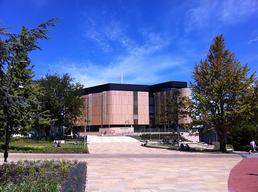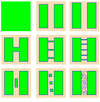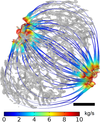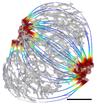IfLS

The Institute for Life Sciences represents a University-wide multidisciplinary collaboration drawing together expertise in science and engineering, with a shared goal to apply scientific discovery to the grand challenges of the day. The Institute's mission is to facilitate fusions of expertise in education and research from a range of disciplines, in order to broaden scientific opportunities.
For more information, please visit: http://www.soton.ac.uk/ifls/
For queries about this topic, contact Richard Edwards.
View the calendar of events relating to this topic.
Projects

A spatially-explicit agent-based model of jaguar population dynamics
Jason Noble, Patrick Doncaster (Investigators), Angela Watkins
A single species spatially-explicit agent-based model has been developed that illustrates the role of simulation modelling, integrated with an adapted least-cost modelling approach and real-world geographical data, in exploring jaguar population dynamics.

Agent-based simulations of jaguar movements through conservation corridors
Jason Noble, Patrick Doncaster (Investigators), Angela Watkins
We present an agent-based model of jaguars (Panthera onca),
scaled for fragmented habitat in Belize where proposals already exist for creating a jaguar corridor. We use a least cost approach to simulate movement paths through alternative possible landscapes.

Development and application of powerful methods for identifying selective sweeps
Andrew Collins, Reuben Pengelly, Timothy Sluckin, Sarah Ennis (Investigators), Clare Horscroft
This project is about detecting regions of the genome which have experienced selective pressure. To achieve this, mathematical models will be developed and applied to human genomic data sets, as well as to those of other species.

Image Based Modelling of Fluid Flow through Lymph Nodes
Tiina Roose, Bharathram Ganapathisubramani, Geraldine Clough (Investigators), Laura Cooper
In this project we are using images of mouse lymph nodes to investigate the fluid transport pathways through it. The images of the nodes are taken using selective plane illumination microscopy, and synchrotron micro computed tomography. The fluid flow is modelled using Darcy's law in COMSOL Multiphysics and the models are run on the Iridis cluster.

Integrating least-cost models with agent-based simulations: example hedgehog responses to fragmented landscapes
Jason Noble, Patrick Doncaster (Investigators), Angela Watkins
This study presents a novel analysis of an agent-based model of hedgehog movements integrated with a least-cost model of hedgehog dispersal and validated in landscapes with a varying degree of habitat fragmentation. A comparison of the fitness of individual agents reveals that incorporating a simple rule into
individual agents, to better mimic movement choices by real hedgehogs, dramatically affects the relationship between individual fitness and fragmentation.

Investigations of Lymphatic Fluid Flow
Tiina Roose, Bharathram Ganapathisubramani, Geraldine Clough (Investigators), Laura Cooper
The lymphatic system performs three main roles returns interstitial fluid back into the blood stream to maintain tissue fluid homeostasis. The aim of this project is to increase our understanding of how the lymph flows through the system by creating three dimensional fluid structure interaction models of the secondary lymphatic valves and image based models of lymph nodes.
Tag based transcriptome analysis of gene expression in a promising green algae
Richard Edwards (Investigator), Andreas Johansson
We use SuperSAGE in combination with next-generation sequencing to compare differences in gene expression between selected mutants and the wild type of a green algae. The data in the form of millions of 26 bp tags representing short stretches of expressed genes, will be analysed to find patterns of variation in gene expression under different conditions.
People
 Geraldine Clough
Geraldine CloughProfessor, Medicine (FM)
 Andrew Collins
Andrew CollinsProfessor, Medicine (FM)
 Sarah Ennis
Sarah EnnisProfessor, Medicine (FM)
 Bharathram Ganapathisubramani
Bharathram GanapathisubramaniProfessor, Engineering Sciences (FEE)
 Timothy Sluckin
Timothy SluckinProfessor, Mathematics (FSHS)
 Peter Smith
Peter SmithProfessor, Institute for Life Sciences (FHS)
 Patrick Doncaster
Patrick DoncasterReader, Biological Sciences (FNES)
 Nicolas Green
Nicolas GreenReader, Electronics and Computer Science (FPAS)
 Rohan Lewis
Rohan LewisReader, Medicine (FM)
 Tiina Roose
Tiina RooseReader, Engineering Sciences (FEE)
 Reuben Pengelly
Reuben PengellySenior Lecturer, Medicine (FM)
 Fraser Sturt
Fraser SturtSenior Lecturer, Humanities (FH)
 Jane Gibson
Jane GibsonLecturer, Biological Sciences (FNES)
 Alistair Bailey
Alistair BaileyResearch Fellow, Medicine (FM)
 Jason Noble
Jason NobleResearch Fellow, Electronics and Computer Science (FPAS)
 Laura Cooper
Laura CooperPostgraduate Research Student, Engineering Sciences (FEE)
 Joseph Egan
Joseph EganPostgraduate Research Student, Mathematics (FSHS)
 Andreas Johansson
Andreas JohanssonPostgraduate Research Student, National Oceanography Centre (FNES)
 Sonya Ridden
Sonya RiddenPostgraduate Research Student, Mathematics (FSHS)
 Angela Watkins
Angela WatkinsPostgraduate Research Student, Biological Sciences (FNES)
 Matthew Higgins
Matthew HigginsUndergraduate Research Student, Biological Sciences (FNES)
 Richard Edwards
Richard EdwardsAlumnus, University of New South Wales, Australia
 Clare Horscroft
Clare HorscroftNone, None